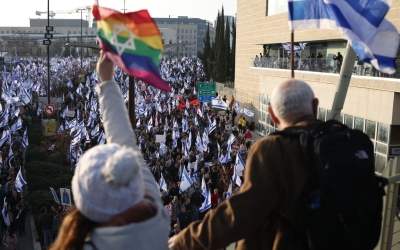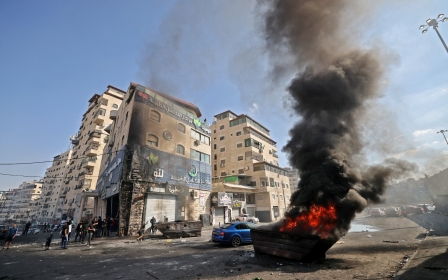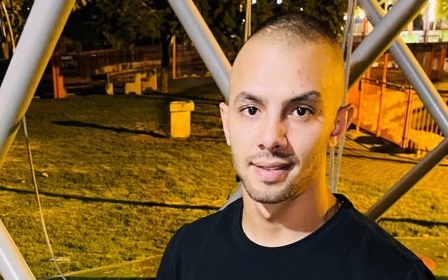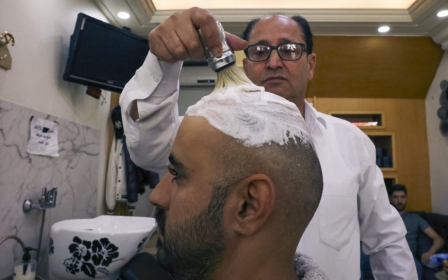'Collective punishment': Palestinians in Jerusalem's only refugee camp rise up against Israel
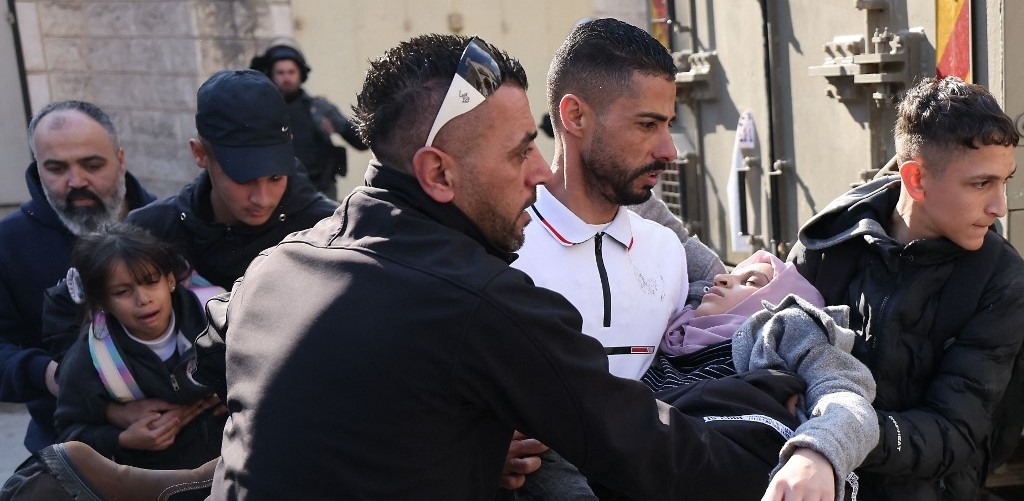
Residents of the Shuafat refugee camp in Jerusalem have accused the Israeli authorities of employing a policy of “collective punishment” after a marked increase in punitive measures against them in recent days.
Shuafat on Sunday witnessed a day of protests and civil disobedience in response to a crackdown on residents that started last week by Itamar Ben-Gvir, Israel's far-right national security minister.
Shurahbeil Alqam, an anti-occupation activist from the camp, said the strike is a result of the “racist” decisions Ben-Gvir recently made.
Shuafat is the only refugee camp within Jerusalem’s municipal boundary.
'Shuafat camp has become a symbol of the ongoing Palestinian suffering as a result of the Israeli occupation's oppressive policies'
- Ramzy Ghanayem, Shuafat resident
“Israel doesn't want us to stay in Jerusalem. It uses all means to expedite our displacement outside the city, even though the camp is the beating heart of Jerusalem,” Alqam told Middle East Eye.
New MEE newsletter: Jerusalem Dispatch
Sign up to get the latest insights and analysis on Israel-Palestine, alongside Turkey Unpacked and other MEE newsletters
Over the past week, Israeli authorities demolished at least seven buildings, arrested 100 people, set up dozens of roadblocks and checkpoints, and confiscated money and assets from former and current political prisoners, among other measures.
Israeli prison authorities, which are part of Ben-Gvir's remit as national security minister, have also begun imposing harsher conditions against Palestinian prisoners, such as closing the canteens, cutting off hot water, and removing kettles and gas hobs used to heat food.
The civil disobedience action in Jerusalem included not going to work in Israeli workplaces and refusing to pay taxes to the Israeli-run municipality and other state agencies.
Young protesters burnt car tyres and set up barricades overnight at entrances to different East Jerusalem neighbourhoods, including Shufat, Anata, Jabal al-Mukabber, Issawiya, and al-Ram town.
In Shuafat, people closed off streets with rubber tires, garbage containers, and wooden boards. They declared that workers wouldn’t go to their jobs or students to their schools, and also called for boycotting the Israeli municipality in Jerusalem.
Shuafat is home to around 140,000 Palestinians whose families were displaced from another refugee camp in the Old City of Jerusalem after 1965.
The UN agency for Palestinian refugees (UNRWA) allocated an area of land for them in the east of the city to live there temporarily until the refugee issue was resolved, but it is still a pending issue.
Ramzy Ghanayem, one of the camp’s residents, says that although the residents have Israeli identity cards, Israel puts a military checkpoint in front of the camp to impede their access to Jerusalem.
"There is a prevailing belief among the residents of Shuafat that Israel wants to expel them outside Jerusalem or get rid of them in some way, because its residents constitute a good percentage of the number of Palestinians in the city, where Israeli settlers seek to become the majority of the population," Ghanayem told MEE.
“Shuafat camp has become a symbol of the ongoing Palestinian suffering as a result of the Israeli occupation's oppressive policies.
"Therefore, it has come to the fore in popular resistance, including civil disobedience, open strikes, and protests rejecting Israeli racism,” Ghanayem added.
Ben Gvir threatens use of 'firm hand'
The latest protests have also been galvanised by the abuse of Palestinian students at the hands of Israeli soldiers on Wednesday. CCTV footage that has gone viral showed an Israeli soldier assaulting a Palestinian student and throwing her to the ground.
Another video showed student Saleh Diab after he was forced to remove his clothes at a military checkpoint, before being beaten. His sister, who tried to intervene and film the attack on her phone, was also assaulted.
The attacks were carried out as the students were on their way to school in the Shuafat refugee camp, as Israeli soldiers prevented them from crossing the main military checkpoint in the area.
Though lying close to Jerusalem's Old City, the camp is separated from the rest of Jerusalem by Israel’s towering separation wall.
Israeli police regularly close the military checkpoint at the entrance to the camp, restricting the movement of Palestinians and impeding students' access to schools outside the camp, and workers and employees to their places of work.
Palestinians say searches at checkpoints near the refugee camp have become more intrusive and aggressive in recent days, following three deadly car-ramming and stabbing attacks earlier this month which left four Israelis killed.
Strike organisers said in a statement on Saturday that Palestinians, especially in Shuafat, have been subjected to "retaliatory measures, abuse, torture, humiliation and daily oppression" since the attacks.
Israeli police on Sunday raided some areas in the city, including Issawiya and Silwan, to remove road barricades, leading to confrontations with protesters.
Ben-Gvir had said in response to the civil disobedience call that his government "will show a firm hand and will not tolerate offenders".
'New intifada'
Four months ago, the Palestinians in the Shuafat camp declared an open strike and civil disobedience for several days, after similar oppressive measures were taken by Israel, following a shooting attack at the camp checkpoint that resulted in the death of an Israeli soldier.
Under popular pressure, Israel was forced to lift the sanctions and ease the blockage.
A few weeks ago, Israeli soldiers shot and killed a Palestinian boy in Shuafat camp, then prevented an ambulance from approaching the scene, stripped the boy of his clothes, and left him to bleed to death. Moreover, they seized his body and prevented his family from burying him for more than a week.
“This crime, which was documented through photographs, sparked a new wave of escalation," Shuafat resident Alqam said. "We have then been noticing that the soldiers had orders to shoot immediately without thinking or waiting. This is what Ben Gvir wants through his reckless decisions."
Alqam accused the Israeli government of imposing "collective punishment" on the Palestinians, warning that such a policy could prompt "a new intifada".
"The people of Shuafat camp want to show the extremist Israeli minister, Itamar Ben Gvir, that the decisions he took to restrict the lives of Palestinians in Jerusalem won’t succeed," he told MEE.
"They won’t allow the imposition of a new reality in their city, which is already suffering from a harsh life under occupation."
Middle East Eye delivers independent and unrivalled coverage and analysis of the Middle East, North Africa and beyond. To learn more about republishing this content and the associated fees, please fill out this form. More about MEE can be found here.


